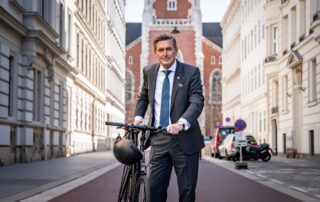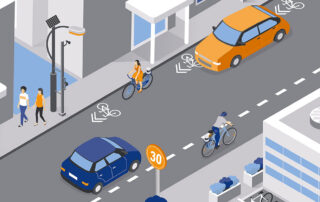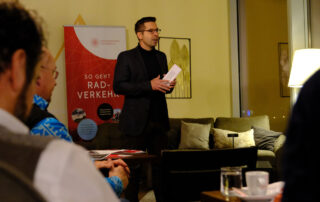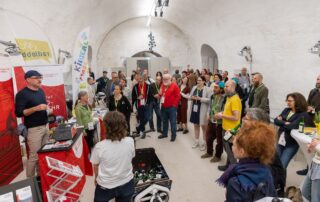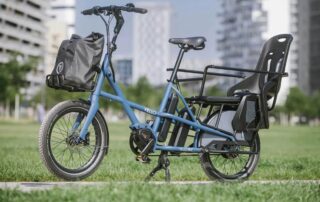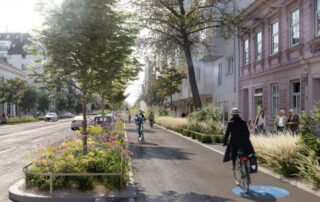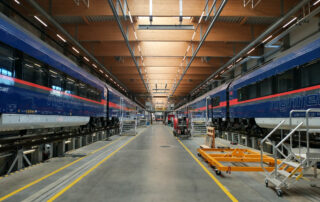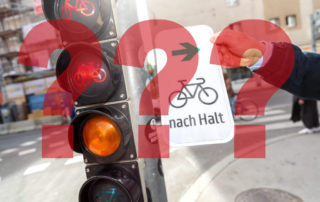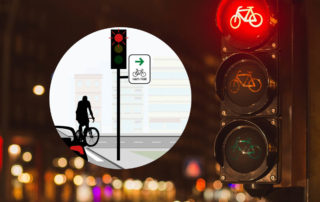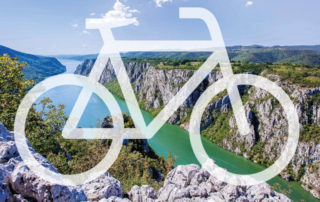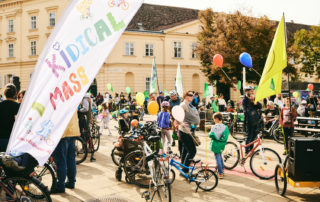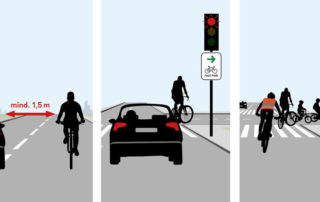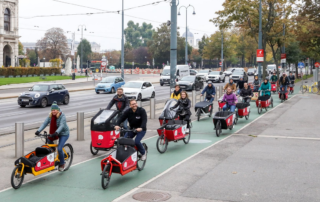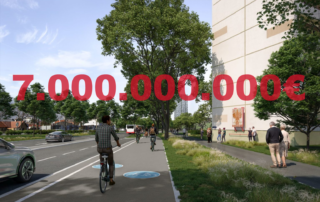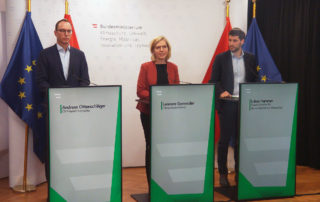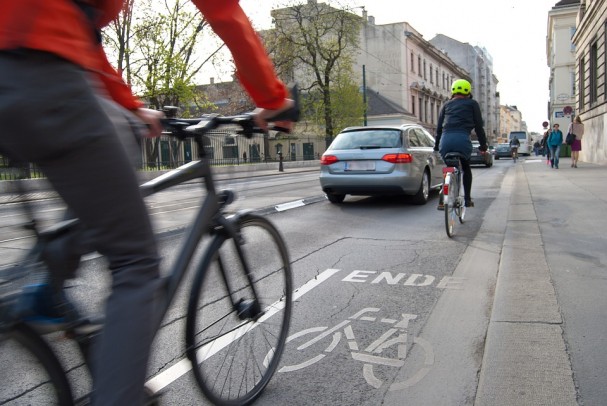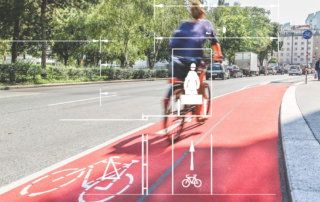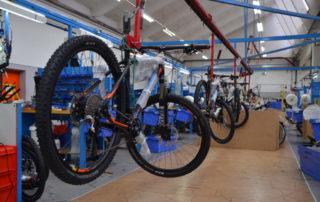Your selection: BMK klimaaktiv mobil
VCÖ Mobility Award 2025 for cycling projects from Vienna to Lienz
The VCÖ Mobility Award 2025 was selected under the motto “Fit for the future for cities and rural areas” in twelve nationwide categories and in nine federal state categories. Among others, the Cycle Competence members Mobilitätsagentur Wien were delighted to receive the award for top project in the category “Walking and Cycling,” and con.sens mobilitätsdesign received an award for [...]
Review of the Cycling Summit in Saalfelden with lots of cycling expertise
The 16th Austrian Cycling Summit in Saalfelden was held under the motto “Rad.Region.Bewegen.” from 3 to 4 June 2025 was the center of the domestic cycling world, with exciting lectures, discussions and excursions for 300 participants. Numerous Cycle Competence members contributed their expertise. Here is an overview of the program. Conference under the patronage of the Minister of Mobility [...]
Report Active Mobility: Trends in Cycling in Austria
How have cycling and walking developed in Austria in recent years? The Active Mobility Report now provides answers. It summarizes the results of the second nationwide survey on active mobility from 2023 and compares them to the first survey conducted in 2021. The report also reveals surprising developments compared to the first survey: declining popularity among young people, fewer [...]
Fragenkatalog zur Ausbildung klimaaktiv mobil Radfahrlehrer:in. Prüfungsfragen zu den Lernmodulen A, B und C
Die einheitliche Grundausbildung zum Radfahrlehrenden wird von etablierten Radfahrschulen in ganz Österreich in Zusammenarbeit mit zertifizierten Radfahr-Mastertrainer:innen entlang von Lernzielen zu Theorie und Praxis umgesetzt. Der vorliegende aktualisierte Fragekatalog dient Auszubildenden wie Prüfer:innen als Lern- und Arbeitsunterlage und fasst alle prüfungsrelevanten Fragen zusammen.
Report: Aktive Mobilität 2024. Erhebungsergebnisse zum Fuß- und Radverkehr in Österreich
Der Report soll als Benchmark im Sinne des Masterplans Radfahren und des Masterplans Gehen dienen. Dazu werden die Ergebnisse einer 2023 zum zweiten Mal durchgeführten österreichweiten Befragung und eine geodatenbasierte Auswertung zu den infrastrukturellen Rahmenbedingungen der Aktiven Mobilität zusammengefasst.
What does Austria’s government programme promise for cycling?
The new federal government's work programme contains important elements of Austria's cycling strategy. The government wants to increase the cycling mode share to 14 per cent and has named some important measures to achieve this, the implementation of which is now up to the new Transport Minister Peter Hanke (SPÖ). We have taken a look at the most important [...]
Grundlagenstudie Fahrradverordnung
Die letzte Novelle der Fahrradverordnung liegt bei Erstellung dieser Grundlagenstudie über 10 Jahre zurück. Ziel der Studie war die gültige Fahrradverordnung auf Kompatibilität mit neuartigen, innovativen Fahrrädern, Fahrradanhängern und -anbauteilen zu prüfen und Empfehlungen hinsichtlich etwaiger Veränderungsbedarfe auszusprechen.
RADBEST research project: Cycling in confined road conditions
In traffic planning practice, the routing of bicycle traffic in confined spaces poses a particular challenge. The RADBEST research project, in which Cycle Competence members Salzburg Research, the Department of Geoinformatics at the Paris Lodron University of Salzburg and con.sens mobilitätsdesign were involved, looked for possible solutions. To this end, regulations and scientific studies were analyzed, experts were interviewed [...]
Study: Austria-wide cycling network Vision covers 25,000 kilometers
What can a cycling network for the whole of Austria look like that guarantees connections to all settlement areas? The study “Austria-wide cycling network Vision” provides an answer to this question and also provides a data-based argumentation for future planning. On behalf of the Ministry of Climate Protection, cycling competence members con.sens mobilitätsdesign and the Department of Geoinformatics at [...]
Report: Aktive Mobilität 2022. Erhebungsergebnisse zum Fuß- und Radverkehr in Österreich
Der Report soll als Benchmark im Sinne des Masterplans Radfahren und des Masterplans Gehen dienen. Dazu werden die Ergebnisse einer 2021 erstmals durchgeführten österreichweiten Befragung und eine geodatenbasierte Auswertung zu den infrastrukturellen Rahmenbedingungen der Aktiven Mobilität zusammengefasst.
Übungshandbuch für klimaaktiv mobil Radfahrkurse
Das vorliegende Handbuch für klimaaktiv mobil Radfahrkurse an Volksschulen stellt Hintergrundwissen darüber bereit, wie Kinder lernen und welche Inhalte in den unterschiedlichen Schulstufen vermittelt werden sollen, und bietet darüber hinaus praktische Übungsanleitungen für das Abhalten von Radfahrkursen.
Masterplan Radfahren 2030
Der Masterplan Radfahren ist die nationale Radverkehrsstrategie Österreichs. Der Masterplan Radfahren 2030 enthält eine Darstellung des Status quo zum Radverkehr in Österreich, beschreibt die bisherigen Erfolge und Umsetzungsschwerpunkte sowie Herausforderungen und Ziele mit aktualisierten Maßnahmen bis 2030.
Cycle Competence webinars in our online academy
More than 20 webinars under our motto “This is cycling!” have been held by our platform members since the beginning of the webinar series in 2021. To make this wealth of knowledge more accessible, we have compiled the individual webinar presentations into an archive: the Cycle Competence Academy! It is available on YouTube and on our overview page “Akademie” in [...]
Research discussion on cycling and mobility transition in Salzburg
This year, our annual cycling competence fireside talk was dedicated to the exciting topic of cycling research. Leading researchers from Vienna, Graz and Salzburg discussed current developments and challenges in cycling and mobility research. The discussion was moderated by Cycle Competence member Martin Loidl from the Paris Lodron University of Salzburg (PLUS) and took place in an attractive setting in [...]
Mit Klimazwergen unterwegs. Ein Leitfaden für Eltern
Der Leitfaden beschreibt Mobilitätslösungen für Babys, Kleinkinder und Schulkinder und gibt hilfreiche Informationen und Tipps: von „Öffi-tauglichen“ Kinderwägen über Fahrrad-Kinderanhänger bis hin zum Kindertransportrad.
The Austrian Bicycle Regulation in international comparison
The Austrian Bicycle Regulation (FVO) supplements the StVO with detailed provisions on child transport, trailers and equipment. It is already 23 years old and requires modernization, as, among other things, the common carriage of two children on longtail transport bikes does not comply with the FVO and multi-axle trailers may not be used. Members of the Cycle Competence Platform [...]
Debate about e-scooter, cycle paths and suitable infrastructure
It is no longer just traditional bicycles that can be found on urban cycle paths. Instead, we are increasingly seeing a variety of transport bikes, pedelecs and e-scooters. These varieties of micromobility are legally considered bicycles in Austria and pose major challenges for the capacity of cycling infrastructure. We summarize an in-depth Ö1 radio debate that revolved around the [...]
This was the Velo-city conference 2024 in Ghent
For 44 years, the Velo-city conference of the European Cyclists Federation has brought together the leading experts in cycling and has thus achieved the status of the world's most important specialist conference. The largest edition to date took place from June 18 to 21 in Ghent, Belgium, with 1,650 participants. Cycle Competence Austria was prominently represented. We bring you [...]
Cycling summit with 10th anniversary of Cycle Competence
The Cycle Competence Austria platform is celebrating its 10th anniversary this year! Founded in 2014 by a group of innovative players in the cycling sector, our platform now has around 30 member companies and supporting members. Knowledge transfer and networking in the service of improving the quality of Austrian cycling is our mission statement, and international activities as the [...]
Bike sales figures 2023: Boom in folding bikes, transport bikes, e-bikes
The 2023 bike sales figures are available and confirm known trends and the effectiveness of targeted bike purchase promotions and company bike models: More than a 50% share of e-bikes for the first time, doubling of folding bike sales, strong growth in e-transport bikes. The Austrian Association of Sporting Goods Manufacturers and Retailers (VSSÖ) presented these results under the [...]
The new cycle-path construction program in Vienna
Since 2021, the City of Vienna has been stepping up the expansion of cycling infrastructure with increased funding from the klimaaktiv mobil program of the Ministry of Climate Protection. The new construction program was published at the end of March 2024. Important cycling axes and gaps in the main cycling network are being tackled and flagship projects such as [...]
Next Generation Nighttrain: Biketransport in the new ÖBB Nightjet
The Austrian Federal Railway (ÖBB) is known for its leading role in European overnight train travel. With the new Nightjet trains expected to operate from December, they aim to launch what they call a ‘flagship service’. We tested the redesigned bike transport options with Radlobby Österreich, a member of Cycle Competence Austria, in the ÖBB depot. Which improvements have been [...]
Implementation of “right turn on red”: the Austrian criteria
Since the change of the Austrian road code in 2022, it has been possible to allow cyclists to turn right or ride straight on at red lights at certain selected junctions. This is marked by additional signage with a green arrow. So far, 29 such signs have been implemented and Vienna has announced a ‘green arrow offensive’ of 150 planned [...]
‘Right Turn on Red’: First implementation and international guidelines
These changes to the Austrian highway code have caused quite a stir: an additional sign with a green arrow now allows cyclists at some junctions to turn right or ride straight on through a red light. The ‘right turn on red’ rule was implemented in countries such as France, Belgium, Denmark, Switzerland and The Netherlands some time ago. Austria is [...]
Danube Cycle Plans: a cycling strategy for nine nations
Cycling traffic as an important part of sustainable mobility in the Danube region stands in the focus of the international project Danube Cycle Plans, which started in September 2020. Now we can present its brand new „Danube Cycling Strategy“, which was developed by the Cycle Competence members Ministry of Climate Action and Verracon together with [...]
VCÖ Mobility Award for Cycle Competence Members
Many Cycle Competence members are glad to be able to celebrate success at having won the 2022 VCÖ Mobility Award. Especially celebrated was the Radlobby, with their winning project ‘Kidical Mass’ which now takes place in 14 cities Austria-wide. Other prize-winning projects by Cycle Competence members were ‘The City and You’, a mobility program in [...]
The new cyclefriendly Austrian Road Code
On the 1st of October the new Austrian road traffic code comes into effect. It contains important improvements for cyclists and pedestrians. Some of its highlights include ‘right turns on red’, minimum overtaking distances for cars, and legalising riding two abreast. The amendment also contains minor flaws and misses two important original proposals from the draft version. […]
The latest from the cargo bike boom: bike-sharing and subsidies for Vienna and Salzburg
Nobody would call a cargo bike a niche product anymore and countless large bike brands both have their own cargo bike models and are ramping up production. This trend also has political support in Vienna and in the province of Salzburg. A smart sharing platform is being introduced to the City of Salzburg and the [...]
Future-oriented Study: Austria’s cycle infrastructure needs 7 Billion Euros of investment.
A study published in April 2022 by Cycle Competence members Planoptimo and Verracon at the request of the Ministry for Climate Protection and all nine Austrian regions has shown exactly how much investment is necessary for Austria to increase cycling to reach the ‘Cycling Masterplan’ goal in 2030. Presuming the highest quality implementation, the figure stands at 7 billion Euros. [...]
New Austrian Road Traffic Code in review
On the 29th of April, minister for climate protection Leonore Gewessler presented the latest draft of the Austrian road traffic code which promises to contain important improvements for cyclists and pedestrians. It is currently under review until the 1st of June and will be put to a parliamentary vote after that. Some of its highlights include ‘right turns on red’, [...]
First Bicycle Policy Audit for Austria completed
The purpose of a Bicycle Policy Audit (BYPAD) is to evaluate the realm of cycling in terms of politics, administration and cycling’s interest groups. This method has so far been carried out in more than 200 cities and regions across Europe. What makes it particularly successful is the ability of its participants to self-evaluate and create space for discussion. For [...]
New guidelines for austrian cycle planning
Current developments in traffic engineering have caused the previous standards and guidelines for road design from 2014 (RVS) to become outdated. From April 1st 2022 new standards and guidelines for cycling infrastructure are being introduced, which a number of our partners helped formulate. In this article, we will present some of the highlights. […]
Economic Factors of Cycling: 46,000 Jobs in Austria
An updated study analysing the economic effects of cycling has demonstrated the many positive consequences of cycling in a set of concrete facts and figures. Cycling creates 46,000 jobs and contributes 2.9 billion Euros to the Austrian economy. In fact, the authors of the study discovered that the bicycle industry contributes more economically than the entire Austrian paper industry, and [...]
Velo-City: World Cycle Conference in Ljubljana
This leading international cycle conference takes place annually, bringing together over 1,200 international experts over four days to give presentations, excursions and to provide a basis for networking within the best and most climate friendly transport sector. This year’s event is closer than it has been for a long time. In 2013, the conference took place in Vienna, and this [...]




